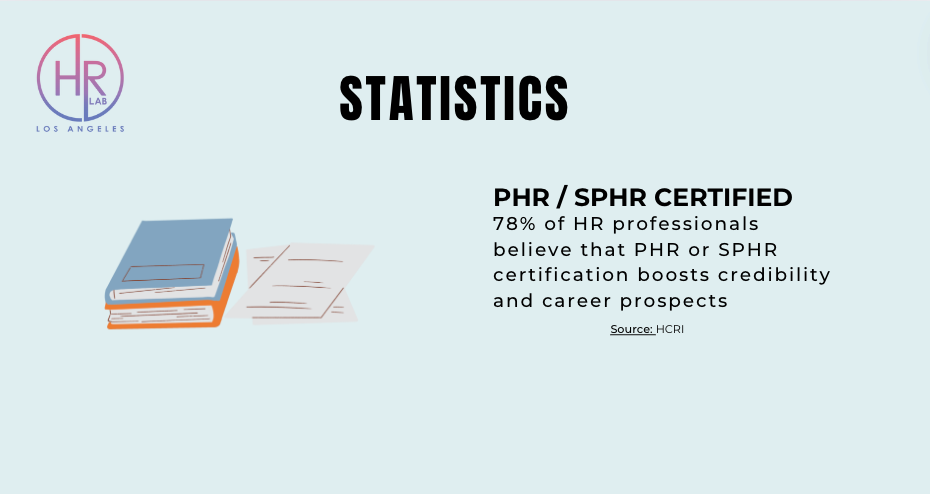Navigating Your HR Career: PHR® vs. SPHR® Certification
- HR Lab Los Angeles

- Aug 30, 2024
- 3 min read
In the realm of Human Resources (HR), certifications wield significant influence, shaping the trajectory of professionals' careers. Among the prestigious certifications, the Professional in Human Resources® (PHR®) and the Senior Professional in Human Resources® (SPHR®) stand out. While both hold considerable value, they cater to distinct facets of HR expertise and career aspirations. This guide aims to illuminate the disparities between the PHR and SPHR certifications, aiding HR professionals in making informed decisions aligned with their career objectives.

Understanding the Distinctions:
Eligibility for both certifications rests on professional experience and educational qualifications. Fundamentally, the PHR emphasizes operational prowess, while the SPHR delves into strategic leadership within the HR domain.
The PHR certification targets HR professionals engaged in daily HR functions, such as employee relations, talent acquisition, and business management. It suits roles encompassing HR management and specialization, accentuating the tactical execution of HR programs and activities. Conversely, the SPHR certification is strategic and organization-centric. It equips HR leaders with the skills necessary for fostering employee engagement, expanding business relations, and aligning HR strategies with broader organizational goals. It's tailored for senior-level positions like Chief Human Resources Officer or Chief People Officer.
Choosing the Right Certification:
Deciding between the PHR and SPHR certifications demands introspection and evaluation of career aspirations, experiences, and objectives.
1. Know Your Career Goals:
Identify your interests and experiences in HR to discern whether your focus leans towards operational execution (PHR) or strategic leadership (SPHR).
2. Certification Eligibility:
Assess your professional experience to determine eligibility for either certification. While both require professional-level experience, the SPHR typically demands more substantial experience in strategic HR roles like HR business partnering.
3. Define Your Career Experiences:
Review the exam content outlines for both certifications to gauge alignment with your professional responsibilities. If your role predominantly involves operational HR functions, the PHR may be the suitable choice. Conversely, if you possess significant experience in strategic HR initiatives, the SPHR might be more fitting.
Exam Length:
It's crucial to consider the duration of each exam when planning your certification journey. The PHR exam comprises 150 multiple-choice questions and has a time limit of 3 hours. On the other hand, the SPHR exam consists of 150 multiple-choice questions and 25 pretest questions, with a time limit of 3 hours and 15 minutes.
Both the PHR and SPHR exams are divided into various functional areas, each covering specific aspects of HR knowledge and practice. For the PHR exam, candidates can expect questions on Business Management, Talent Planning and Acquisition, Learning and Development, Total Rewards, Employee and Labor Relations, and Risk Management. Similarly, the SPHR exam includes sections on Business Leadership, Talent Development and Management, HR Service Delivery, Employee and Labor Relations, Total Rewards, and Risk Management. Understanding the content breakdown of each exam is crucial for candidates to focus their preparation efforts effectively and ensure comprehensive readiness for their certification journey.
Knowledge Is Power!
The decision to pursue either the PHR or SPHR certification hinges on your career aspirations, experiences, and long-term goals. Whether sequentially obtaining both certifications or selecting one that aligns with your current role, investing in professional certification underscores your commitment to excellence in the dynamic HR landscape.
For more information, please visit the HRCI Website or email us at support@hrlablosangeles.com.
About HR Lab: Formed in 2020, in the midst of the pandemic, HR Lab is here to make a difference. At HR Lab, we work to strengthen workforce quality by improving the HR system, ensuring its ongoing relevance, and preparing employers, workers, educators, and governments to use it effectively. Our vision is a labor market that relies on the relevance, quality, and value of workforce credentials for opportunities, growth, and development.
About this blog: If you would like to share your knowledge with our readers, have an idea for a topic, or comment on one of our blogs, please let us know at support@hrlablosangeles.com
Disclaimer: The information in these materials should not be considered legal, accounting, or investment advice, and it should not substitute for legal, accounting, investment, and other professional advice where the facts and circumstances warrant. It is provided for informational purposes only. If you require legal, accounting, or investment advice, or need other professional assistance, you should always consult your attorney, accountant, or other professional advisors to discuss your particular facts, circumstances, business, personal finance, and investment needs.





Comments